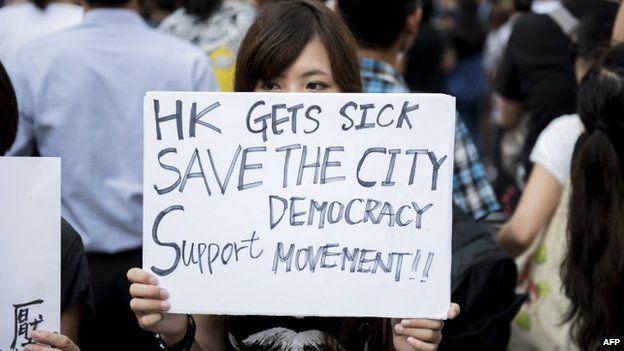China media: Hong Kong protests
- Published

Mainland papers condemn the protests in Hong Kong, blaming "radical opposition forces" for stirring up trouble.
Pro-democracy protests erupted into a major street campaign on Sunday. Protesters want Beijing to scrap rules allowing it to vet candidates for Hong Kong's top job in the 2017 polls.
Most Chinese language papers in the mainland have criticised the protest, calling it an "illegal assembly". The papers, however, have refrained from publishing photographs or giving details.
Describing the gathering as "unlawful" and "unauthorised", a report in the English edition of the China Daily mentions that the police fired tear gas on protestors.
The paper's editorial calls the protest an "opportunistic adventure", and blames the Occupy Central group for using the students to threaten Hong Kong's "economic well-being and social stability".
"Realising their failure to summon residents' support for their cause, the 'Occupy' organisers are trying to take advantage of the students' idealism and enthusiasm for promoting democratic advancement in the city," says the daily.
The paper adds that the protesters have a "political agenda".
"By knowingly putting young students in jeopardy, 'Occupy' organisers demonstrate a desperate attempt to advance their political agenda, even at the expense of the safety of innocent people… the political extremists in the city have completely exposed the opportunistic nature of their endeavours," it points out.
The English edition of the Global Times reports that the police have shown "restraint in handling demonstrators". The editorial criticises the "street movement", adding that it is ruining Hong Kong's image.
"As Chinese mainlanders, we feel sorrow over the chaos in Hong Kong on Sunday. Radical opposition forces in Hong Kong should be blamed," says the paper.
It goes on to criticise some US media outlets for "linking the Occupy Central movement with the Tiananmen Incident in 1989".
"By hyping such a groundless comparison, they attempt to mislead and stir up Hong Kong's society. China is no longer the same nation it was 25 years ago. We have accumulated experience and drawn lessons from others, which help strengthen our judgment when faced with social disorder," it says.
The paper also asks the Hong Kong government to "take actions to resume order in response to the damage the radical forces caused to society".
"The central government must firmly support the Hong Kong Special Administrative Region in taking resolute action against radical activities, including drawing the red line of Hong Kong's rule of law. It must be made clear that there is no uncertainty over political reform in Hong Kong," it warns.
An article by Wang Qiang, a professor at the College of Armed Police, on Sohu news portal suggests "the armed police" can be mobilised to handle the situation if the law enforcers in Hong Kong "do not have the ability to do so".
'Temporary freeze'
In contrast to the limited reporting in China's press, media outlets in Hong Kong are giving prominent coverage to the protests.
Pro-Beijing media outlets have urged the students to end their protest, while independent outlets are scathing in their criticism of the government.
Pro-Beijing Sing Tao Daily blames the Occupy Central activists for pushing Hong Kong to dangerous ground.
"The conflict is not only affecting the financial district area, but all regions and industries are affected. These activists should bear the responsibility," warns the paper.
In an emotionally-charged editorial, the popular pro-democracy Apple Daily tells the "heartless", "tyrannical", "unreasonable" regime to "get lost" after police fired tear gas and pepper spray on the protesters.
"What mistakes have the people committed? They were only speaking up for the students and protecting them as they could not bear to see the authorities bullying them," it says.
"People have lost hope in this government that has been elected by a small group of people. We know that the determination of the people and students to fight for democracy will never be weakened," it says.
The Ming Pao daily, known as an intellectual paper in Hong Kong, subtly criticises the protesters for "not realising their promise" of a "non-violent protest" based on the "ideal of love and peace", while noting that the police should have refrained from using tear gas on the protesters.
"Up to this stage, perhaps the authorities should consider what is best for Hong Kong. For example, having a temporary freeze on the political reform discussions and wait until the second round of consultation," suggests the editorial.
And finally, an article in the South China Morning Post shines some optimism.
"But perhaps there is an even simpler reason for optimism: this generation of students who have, again and again, showed their willingness to stand up and speak truth to power. If they are indeed the leaders of tomorrow's Hong Kong, we can still hope for change," says the article.
BBC Monitoring reports and analyses news from TV, radio, web and print media around the world. For more reports from BBC Monitoring, click here. You can follow BBC Monitoring on Twitter and Facebook.